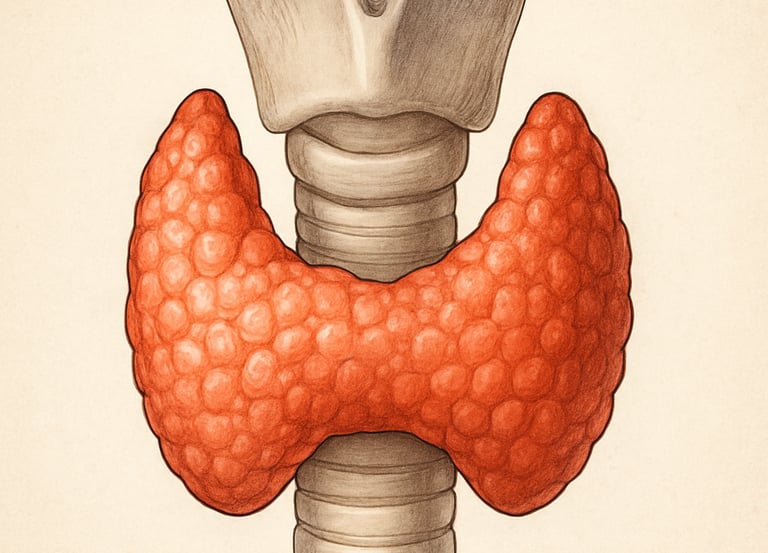Why Is Your Body Attacking Your Thyroid? A Deeper Look At Hashimoto's


Hashimoto’s thyroiditis is the most common cause of hypothyroidism in the U.S. It’s an autoimmune condition in which the immune system mistakenly attacks the thyroid gland, slowly damaging it over time. While conventional medicine typically manages Hashimoto’s with thyroid hormone replacement (like levothyroxine), functional medicine goes deeper — asking why the immune system is attacking the thyroid in the first place.
What Causes Hashimoto’s? (The Functional Medicine Perspective)
Functional medicine sees Hashimoto’s not as a thyroid problem alone, but as a whole-body immune dysfunction with deeper triggers. Here are some of the most common root causes:
1. Gut Imbalance (Leaky Gut and Dysbiosis)
Seventy to eighty percent of the immune system resides in the gut. If the gut lining is compromised (also known as leaky gut), food particles, toxins, or bacteria can slip through and trigger immune overactivation — including thyroid autoimmunity.
Common contributors include:
Chronic stress
Antibiotic or NSAID overuse
Diets high in sugar or processed foods
Undiagnosed infections (such as H. pylori, parasites, or candida)
2. Food Sensitivities (Especially Gluten and Dairy)
Many with Hashimoto’s are sensitive or intolerant to gluten. This may be due to molecular mimicry, where gluten proteins resemble thyroid tissue, confusing the immune system and triggering an attack.
Other common culprits include:
Casein (a dairy protein)
Soy
Corn
Eggs
3. Chronic Infections and Pathogens
Latent infections — especially Epstein-Barr Virus (EBV), Yersinia enterocolitica, or dental infections — can provoke or perpetuate autoimmunity.
Possible clues include:
Fatigue flares
Swollen glands
History of mononucleosis or frequent sore throats
4. Nutrient Deficiencies
Certain nutrients are essential for both immune regulation and thyroid hormone production.
Common deficiencies seen in Hashimoto’s:
Selenium (protects thyroid tissue from inflammation)
Zinc (modulates immunity)
Vitamin D (low levels are linked to many autoimmune diseases)
Magnesium, B12, and iron (support energy and metabolic function)
5. Chronic Stress and Adrenal Dysfunction
Cortisol imbalances from long-term stress can disrupt immune regulation, increase inflammation, and impair the conversion of thyroid hormones (from T4 to active T3).
6. Toxin Exposure
Environmental toxins — including heavy metals, pesticides, plastics like BPA, and fluoride — can burden the liver and damage thyroid tissue. Amy Papa Wellness provides HTMA (Hair Tissue Mineral Analysis) and other advanced tests to look for heavy metal body load, mycotoxins, glyphosate, and etc.
How Functional Nutrition Can Help With Hashimoto’s
The goal of functional nutrition is to calm the autoimmune attack, support thyroid function, and restore overall balance.
Here’s how:
1. Personalized Anti-Inflammatory Diet
Often starting with a gluten-free or autoimmune paleo (AIP) approach, which eliminates common immune triggers while promoting gut healing.
Typically includes:
Removing gluten, dairy, soy, and processed foods
Adding omega-3 fats, bone broth, and antioxidant-rich vegetables
Reintroducing foods carefully over time
2. Targeted Supplementation
Tailored based on lab testing and symptoms. Some of the most supportive nutrients include:
Selenium – shown to reduce thyroid antibodies
Vitamin D – ideal blood levels are around 50 to 70 ng/mL
Zinc and B vitamins – support thyroid hormone conversion
Probiotics and L-glutamine – promote gut repair
Adaptogenic herbs (ashwagandha, rhodiola) – help manage stress
3. Comprehensive Lab Testing
Functional practitioners typically assess more than just TSH. A full thyroid and health evaluation may include:
Free T3, Free T4, Reverse T3, TPO and TG antibodies
Stool analysis or GI-MAP to evaluate gut health
Nutrient levels (serum, red blood cell, or organic acids testing)
Food sensitivity panels
Cortisol rhythm through salivary or DUTCH testing
4. Stress and Lifestyle Management
This includes addressing sleep quality, using nervous system tools (such as breathwork), and making space for emotional processing.
5. Reducing Toxin Burden
Functional nutrition protocols often support liver detoxification and recommend avoiding exposures from:
Plastic containers and water bottles
Conventional produce (opt for organic when possible)
Toxic personal care or household products
Summary
Hashimoto’s is not just a thyroid condition — it’s an immune system imbalance. Functional nutrition seeks to answer: What’s triggering the immune system? And how do we restore balance?
By identifying root causes, supporting the gut, reducing inflammation, replenishing key nutrients, and addressing lifestyle stressors, many people with Hashimoto’s are able to reduce antibodies, feel more energized, and even lower their medication needs (under medical supervision).
Ready to get to the root of your Hashimoto’s symptoms? At Amy Papa Wellness, we take a personalized, functional medicine approach to help you identify and address your unique triggers — whether they’re gut imbalances, nutrient deficiencies, environmental toxins, or more.
Schedule a consultation today to receive a comprehensive evaluation and tailored support. As a client, you'll also gain access to deep discounts on professional-grade supplements to support your healing journey.
